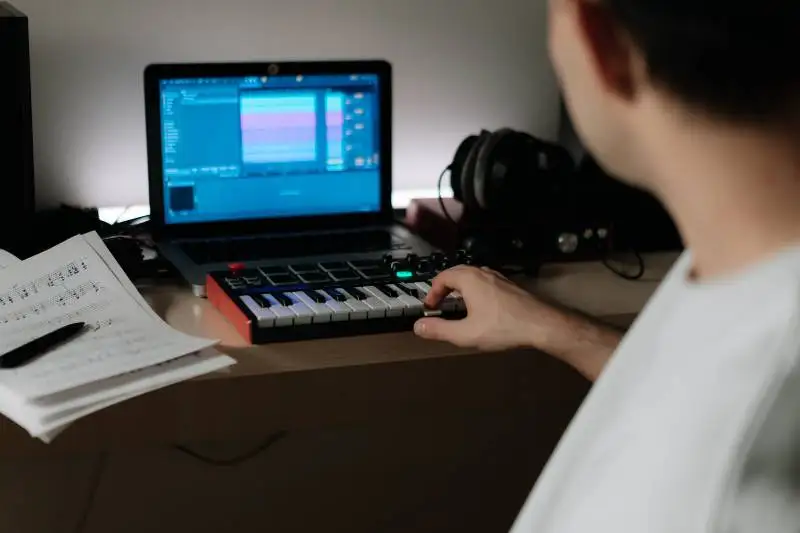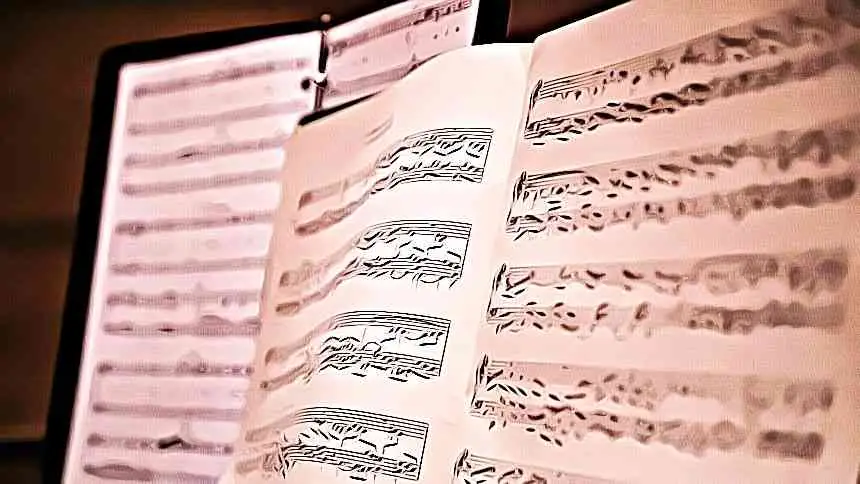When it comes to songwriting, one of the most important concepts to understand is how to create a catchy hook. There's plenty of ways to create a song's hook, but a few key elements every songwriter should keep in mind in order to create song hooks are catchy rhythm, melody, and phrasing.
Below, we'll dive into what a song's hook really is and teach you how to incorporate a killer hook into your future songs. Let's dive into it!
What Is a Hook In a Song?
So, what is a hook in a song anyway? To boil it down, a hook is a short line or phrase in a song that aims to make a song more memorable when a listener hears it. A great hook does this by utilizing a strong melody, rhythm, or lyrical phrase.
One great example of an excellent hook is "8675309" in the 80's classic "8675309 Jenny Jenny" track by the one hit wonder, Tommy Tutone:
A hook makes a song memorable, even if it's only utilizing a simple melody. You'll usually hear a hook multiple times throughout a whole song, and a hook is often incorporated as a key part of the chorus lyric section. Catchy songs all have one thing in common: They all utilize an effective hook.
Hook writing is an art in itself and reaches modern music across any genre from rap songs to popular music, and anywhere in between. Creating a memorable yet short musical idea can be challenging, but it's one of the most important skills you'll want to cultivate in order to advance throughout the music industry.
Hook Vs. Chorus: What's The Difference?
Understanding the difference between hook vs. chorus can get confusing. A chorus and a hook can be one in the same depending on the composition. Generally speaking, a hook is a smaller, more memorable section of a chorus, though not all hooks have to be contained within a song's chorus.
The chorus is any stanza that's repeated throughout a song, usually consisting of multiple lines. People usually picture lyrics or melodic lines when it comes to the chorus. In contrast, a hook is just a couple of words strung together that could be anywhere throughout the song. There's also a larger variety of hooks including the instrumental hook, intro hook, melodic hook, lyrical hook, or rhythm hook.

Where Is A Hook Within A Song Structure?
A hook can most commonly be found at within the chorus section of a song . For a more impactful hook, the surrounding chord progression may change to create more of contrast between the hook and the rest of the song. Hooks are sometimes accompanied by a strong instrumental melody to help reinforce their vitality. A hook can also be the answer or point of relief in songs that are focused on building tension around a certain concept or question. Above all, it's clear that a good hook is able to stand out amongst the rest of the song.
Examples of Hooks in Famous Songs
If you're still trying to decipher what is a hook in a song, it may be easier to listen to some example hooks to get an idea of what a hook could sound like. You'll find that each of the song hooks listen below all serve to make a song memorable, even though the hooks all accomplish this in different ways.
One of the easiest ways to identify a hook is to look to hip hop. Plenty of hip hop songs utilize melodic hooks that are in contrast to the rest of the rhythmic rhymes and beats. In a Tribe Called Quest's classic, "Can I Kick It?" the hook is clearly identified as the title phrase of the track:
You can also find plenty of hooks communicated in the instrumental part of a song. For instance, plenty of dance music utilizes this concept. Those within the community may refer to the many hooks throughout EDM as a "drop" which could just translate to a clever instrumental hook or rhythmic hook.
For instance, in Regard's "You", the featured singers provide plenty of catchy melodies on the chorus, but one of the most standout features is the synthesizer hook that follows the chorus:
You can find plenty of examples of strong hooks throughout the music industry. If you find that a phrase of memorable lyrics, melodic phrases, or a catchy rhythm doesn't seem to escape your mind, chances are, you've found yourself an effective hook.
Different Types of Hooks in Music
There are plenty of ways to create a catchy melodic idea to create your hook. Here are the most common types of hooks in music along with a couple of inspiring examples to help inspire your various song hook ideas.
Melodic Hooks
These are the types of hooks that are anchored by a melodic idea. Think of Katy Perry's "Roar". The word "Roar" isn't super interesting in itself, but the vocal melody she adds behind it is what is cemented into your mind long after your first listen:
Rhythm Hooks
When it comes to a rhythmic hook, the best examples can be found in hip hop. These hooks rely primarily on the rhythmic context to make them catchy. A great example can be found in Megan Thee Stallion's Savage with the "I'm a savage" section:
Lyrical Hooks
A lyrical hook provides some sort of relief to the tension in the song, relying primarily on a song's lyrics to evoke this. Taylor Swift does an excellent job of this in a lot of her songs. In "All Too Well", the lyrical phrase effortlessly encompasses the bittersweet sentiment of the rest of the song:
Instrumental Hooks
Some songs use a background instrumental hook to capture a listener's attention. The acoustic and electric guitar in Led Zeppelin's "Stairway to Heaven" end up being more captivating than the title phrase of the track:
How To Write a Hook in a Song
Are you ready to write an ear worm of your own? Here is an easy method to start writing hooks, even if you don't have any prior music education under your belt.
- Consider your desired song title or the rest of the song lyrics.
- Create the hook melody first.
- Experiment with multiple catchy melody ideas.
- Try out your melodic phrase to see if it fits.
1. Consider your desired song title or the rest of the song lyrics.
To start, it may make sense to take a lyrical approach . You can think of your hook as the elevator pitch for your song. It should encapsulate the overarching topic of your track within a few words. Think about what you want to express or write about in order to start conceptualizing what your hook might contain.
2.Create the hook melody first.
If the words aren't coming easy, start creating some melodies . You can use melodic syllables like "ooh" or "la" to get your ideas out. It's a good idea to have a voice memo recording running on your phone so that you don't lose any of your ideas. If you don't know where to start, try singing going up or down semi or whole tone notes within a scale.
3.Experiment with multiple catchy melody ideas.
Don't just create one hook, make many! Record your polished hook ideas and listen back to each hook. Whichever hook stands out the most as memorable and catchy is one you should further pursue.
4.Try out your melodic phrase to see if it fits.
If you already have the rest of your song's instrumental, test out your hook to see if it's working within the context of the track. Alternatively, you can build your song around the hook. Keep branching off of your hook's melodic elements and concepts to craft different sections of your song.

Tips For Writing Great Hooks for Songs
Are you still struggling to create a noteworthy hook? Here are a couple of tips to keep in mind in order to write an excellent hook.
- Your hook should be great at capturing someone's attention. Try to think of what grabs you as a listener and apply the same wisdom to your own creative process. If your current hook isn't sticking, it's time to take a different approach.
- Come up with at least one hook for each song you create. Make a habit of creating multiple hooks for your composition and then picking the best one. Not only is this an excellent songwriting technique , it's also a great way to ensure that you're coming out of your writing sessions with a hook that's truly catchy.
- Aim to capture the listener's attention and the listener's memory. In addition to finding a catchy melody, be sure to consider other factors like rhythm and lyrics that can stand out amongst the rest of a song.
- Listen to many hooks to gain perspective and inspiration throughout your writing process. All good ideas come from somewhere else. While you should never blatantly copy a melodic line, rhythm, or lyrics of a hook, it's always a good idea to get inspired by the greats while you're learning to write strong hooks.
- Know that writing hooks gets easier over time. As your write more hooks over the course of your music career, the process will become more second nature. Practice truly makes perfect, so don't get discouraged if your first hook isn't worthy of the top of the charts.
Writing a Hook in a Song FAQs
Are you still struggling to grasp the concept of musical hooks? Here are couple of frequently asked questions and answers to expand your understanding of how a song hook works.
How Do You Find A Hook In A Song?
A hook is usually the most repeated phrase in a song that might be included as the title name of the track. You probably know the hook intuitively and can usually find the hook as a part of the chorus. For example, the hook in Doja Cat’s “Say So”, is “Why Don’t You Say So?”.
Why Is It Called A Hook In A Song?
It’s called a hook in a song since it quite literally gets you “hooked”. The hook is designed to stay stuck in your head, creating a memorable song you’ll want to revisit over and over again. The hook is usually super short but sweet enough to transform a typical song into an earworm.

What Makes A Good Song Hook?
A good song hook is short, sweet, and melodically catchy. If your song poses a question or builds some sort of tension, a hook can provide a point of relief or an answer to that question. Great song hooks are memorable ones.
Does Every Song Need a Hook?
Not every song needs a hook, though it can be incredibly helpful to have a hook if you want to create a memorable piece of music. Hooks can also be a great way to start writing a song. As long as you have a good hook, you can craft a great song around it.
How Long Should A Hook Be In A Song?
This is entirely subjective, but most hooks are a couple of words, and usually no more than a phrase or two. Typically, shorter phrases are more memorable so it makes sense to keep your hook as concise as possible. Therefore, your hook should be long enough to convey your melodic ideas, but short enough to be undeniably catchy.
Can You Have More Than One Hook in a Song?
You can have more than one hook in a song, especially if you’re utilizing multiple different types of hooks. Any short, repeated element can be considered a hook, and plenty of pop songs incorporate multiple hooks into a single song.
Can You Start A Song With a Hook?
You can start a song with a hook. These types of hooks are called “intro hooks” and are pretty common in pop music. Olivia Rodrigo’s “good 4 u” utilizes an intro hook with the repeated opening and closing phrase of the song.
Can The Hook Be The Chorus?
A hook can be a chorus. It can also just be a part of the chorus, since the hook alone may not be lengthy enough to convey everything you’d like to put out in the chorus. Choruses can also consist of just the hook or the hook repeated.
How Do You Make a Hook Sound Better?
The best hooks are the most memorable ones. You can make a hook more memorable by creating a catchier melodic structure behind it, rhythm, or adjusting your phrasing. If you have multiple hook ideas, ask those you trust for honest feedback.
How Do I Write After the Hook?
If all you have is a hook to start, let yourself experiment to see what might be best to come before or after its placement. You can also take a listen to some of your favorite songs and analyze how some of your favorite artists incorporated hooks and the structure around it into their compositions to gain some additional insight.
As you can see, a strong melodic hook can make or break a song. Hopefully, this article makes it easier for you to craft catchy hook ideas from the comfort of your own home. Enjoy the process of learning how to write a hook the leave's an impression on its listeners!





